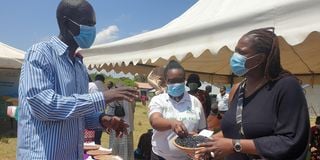Farmers using community seed banks to fight climate change

Suzanne Ngo-Eyok (right), the MD, Africa Hub of the Alliance with Nyando community seed bank chairman Eddy Ouko (left) and Gloria Otieno, a genetics resources and food security policy specialist during a recent seeds fair.
Climate change is occasioned by erratic weather conditions which present numerous challenges in the food sector, resulting to acute food shortages.
But if farmers can access the right planting materials which are adoptive to climate change, then they can still remain productive under harsh weather conditions.
Keen on promoting open seed source system (OSSS), international research organisations have been searching for and carrying out research on seeds that enhance food and nutritional security, as well as social-economic empowerment.
Seed fairs
During two seed fairs held recently in lower and upper Nyando in Kisumu county, farmers had an opportunity to showcase different varieties of sorghum, millet and beans, which have been tried and found suitable for the region in the wake of the effects of climate change.
The seed fairs and a farmers’ meeting brought together a total of over 150 farmers from different regions including upper and lower Nyando, Kakamega and Vihiga counties.
Also in attendance were experts in the seed and food sector, breeders and extension workers among other participants, some of whom later gathered at a hotel in Kisumu to discuss, among other issues, the policy framework.
Most of the seeds showcased during the fairs were tried under the OSSS project, funded under the Food and Agriculture (FAO)’s benefit sharing fund of the international treaty for plant genetic resources for food and agriculture.
The programme has been facilitated by the Alliance of Bioversity International and the International Centre for Tropial Agriculture (The Alliance) in Western Kenya since 2016.
Best varieties
Trials for best performing varieties were done in partnership with local farmers.
“The varieties were tested for three cycles before the final selection,” says Dr Gloria Otieno, the genetics resources and food security policy specialist at the Alliance.
“Some of the varieties were slowly getting extinct but have since been reclaimed for future multiplication and use,” she added.
Indigenous seeds
Due to climate change, indigenous varieties are slowly getting lost, yet they play a key role in enhancing food and nutrition security.
“The effects of climate change are causing loss of varieties, yet the indigenous seeds are very significant towards ensuring food security as they are more adoptive and resilient,” said Ms Suzanne Ngo-Eyok, Managing Director, Africa Hub of the Alliance.
The seeds are a result of intensive research work, geared towards enhancing access to genetic resources for climate change adoption.
Some of these varieties were sourced from national gene banks in Kenya, Tanzania and Uganda for trials in both lower and upper Nyando. These areas are considered arid and semi-arid lands (Asals), hence the need for resilient seeds.
Common trial farm
Members of the Nyando community seed bank had a common trial farm where they grew varieties of beans, sorghum and millet.
The farmers hailed the indigenous seeds system, saying it is not only a solution to food and nutrition security but also a way of keeping lifestyle diseases at bay.
“By growing and consuming indigenous foods, we are going to build immunity, just as our grandparents were not susceptible to lifestyle diseases,” said Pius Anyika, a farmer from Kakamega.
He challenged other farmers to be keen on promoting varieties which are resilient to climate change as a way of conserving them for future generations.
As part of the efforts to ensure OSSS, the Alliance has been working with relevant authorities in East Africa towards an enabling environment for OSSS.
Not readily available
Most of these seeds, Ms Ngo-Eyok noted, are not readily available in agrovet shops, yet they are significant in enhancing diversity and productivity.
“If we have quality seeds, there will be demand for the same and farmers have the potential to produce for local market as well as for export,” she added
In Uganda for example, the concept of quality declared seed (QDS) is acceptable and gaining momentum. This way, farmers at the grassroots can access seeds with ease, affordably and conveniently.
Although this concept is yet to be adopted in Kenya legally and as a way of life, establishment of community seed banks is a good start towards OSSS.
Easy access
The Nyando community seed bank, for example, was launched in 2019 in a bid to provide easy access to seeds by farmers. It also ensures seed security.
It has a membership of 100 farmers from local villages, who have been engaged in testing for productivity, adoption and resilience of several beans, sorghum and millet varieties.
The seed bank’s chairman, Eddy Ouko, said farmers had already selected, with help from experts, the best performing varieties and earmarked them for multiplication.
“We are looking into giving these varieties local names so that we can introduce them fully as part of our culture and farming. For example, we have already named one bean variety from Uganda Okuodo as it looks like a tick,” said Mr Ouko.
Some of the varieties were found to be highly productive while others were resistant to diseases and others were classified as high yielding.





